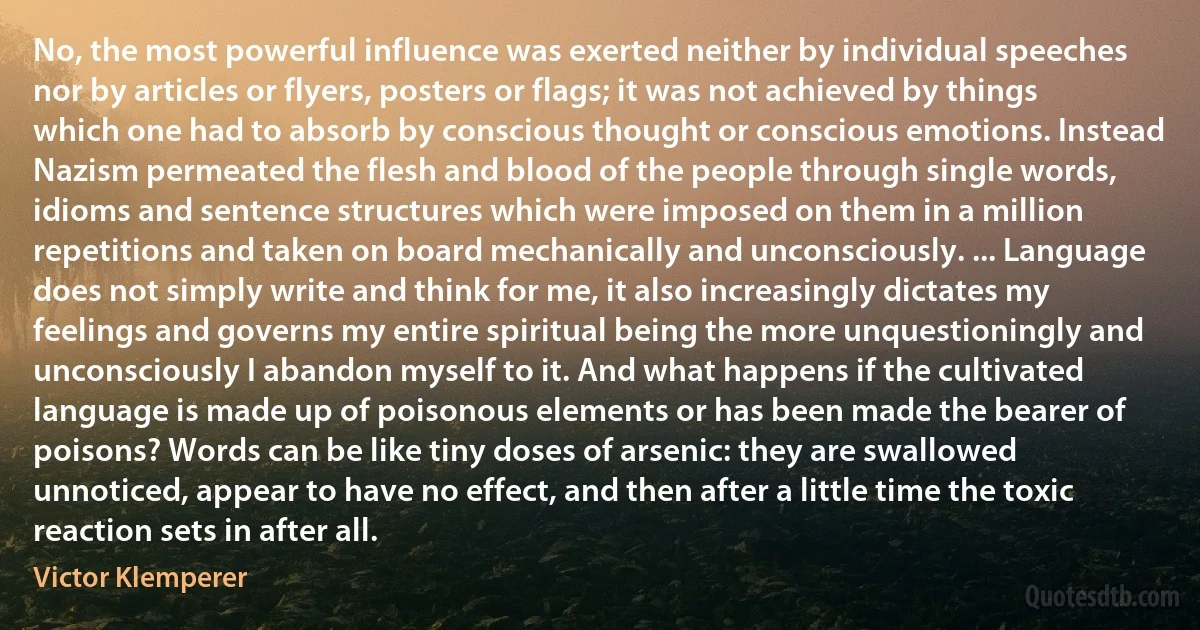
No, the most powerful influence was exerted neither by individual speeches nor by articles or flyers, posters or flags; it was not achieved by things which one had to absorb by conscious thought or conscious emotions. Instead Nazism permeated the flesh and blood of the people through single words, idioms and sentence structures which were imposed on them in a million repetitions and taken on board mechanically and unconsciously. ... Language does not simply write and think for me, it also increasingly dictates my feelings and governs my entire spiritual being the more unquestioningly and unconsciously I abandon myself to it. And what happens if the cultivated language is made up of poisonous elements or has been made the bearer of poisons? Words can be like tiny doses of arsenic: they are swallowed unnoticed, appear to have no effect, and then after a little time the toxic reaction sets in after all.
Victor KlempererRelated topics
appear arsenic blood entire flesh language nor people reaction single take thought think time write words things nazism articlesRelated quotes
Earl Grey rose, and said, that the motion of the noble lord had his most entire and full assent...he could not sit silent on the occasion, impressed as he was with feelings of gratitude and admiration towards that great commander who was the subject of this vote, and deriving a just national pride from the consideration, that the honour of the country had been so greatly exalted by the conduct of that distinguished general and his brave army...the apparent contrast, or contradiction, as some might call it, between the sentiments which he had now delivered, and the opinions which he had expressed on former occasions...upon the whole it appeared manifest, that by the most exemplary and patient perseverance under unfavourable circumstances, and at the moment of action by the skilful combination of force and the most determined courage, a great success had been achieved, and as much honour done to the British army as any victory could have accomplished.

Charles Grey, 2nd Earl Grey
In the Vietnam War, the leaders of the White House claimed at the time that it was a necessary and crucial war, and during it, Donald Rumsfeld and his aides murdered two million villagers. And when Kennedy took over the presidency and deviated from the general line of policy drawn up for the White House and wanted to stop this unjust war, that angered the owners of the major corporations who were benefiting from its continuation. And so Kennedy was killed, and al-Qaida wasn't present at that time, but rather, those corporations were the primary beneficiary from his killing. And the war continued after that for approximately one decade. But after it became clear to you that it was an unjust and unnecessary war, you made one of your greatest mistakes, in that you neither brought to account nor punished those who waged this war, not even the most violent of its murderers, Rumsfeld.

Osama bin Laden
There are today an increasing number of people whose awareness is, in the strict sense of the phrase, without a focus; and the techniques which have transformed the framework of daily life for such people at such a prodigious pace – I am thinking particularly of the cinema and the radio – are making a most powerful contribution towards this defocalizing process. ... The human creature under normal conditions finds his bearings in relation to other people, and also to physical objects, that are not only close to him in space but also linked to him by a feeling of intimacy. Of this feeling of intimacy, I would say that in itself it tends to create a focus for human awareness. One might go farther and speak of a kind of constellation, at once material and spiritual, which under normal conditions assembles itself around each human being. ... This kind of constellation around the individual life is, in a great many countries, in process of dissolution.

Gabriel Marcel
Why should we put up with the present evils in our society? As opposed to the society we are visualizing, the present one can be described as a diseased one. The evils are there on all levels, international and national, and even within the smaller units such as towns and families. Of course, the disease did not appear like a bolt from the blue, either yesterday, or last year. It is the result of factors that have deep roots and long lives. These consist of privations, discriminations oppressions, bigotries, hatreds, and hostilities; poverty, ignorance, hunger, and illiteracy. Each and all of these have been left to us as ar evil heritage from the past. The fundamental difference between our situation today and that of our forefathers is that now knowledge has enabled us to realize that these evils are neither natural nor inevitable in the same way as we have found that cholera or the bubonic plague are not necessary calamities.

Muhammad Reza Pahlavi
Of course, violence is never justified. But seen in this context – amid a highly toxic environment, defined by mistrust and resentment, stoked by years of bad feelings, and spurred by illegal and misguided practices – it is not difficult to imagine how a single tragic incident set off the city of Ferguson like a powder keg. In a sense, members of the community may not have been responding only to a single isolated confrontation, but also to a pervasive, corrosive, and deeply unfortunate lack of trust – attributable to numerous constitutional violations by their law enforcement officials including First Amendment abuses, unreasonable searches and seizures, and excessive and dangerous use of force; exacerbated by severely disproportionate use of these tactics against African Americans; and driven by overriding pressure from the city to use law enforcement not as a public service, but as a tool for raising revenue.

Eric Holder
